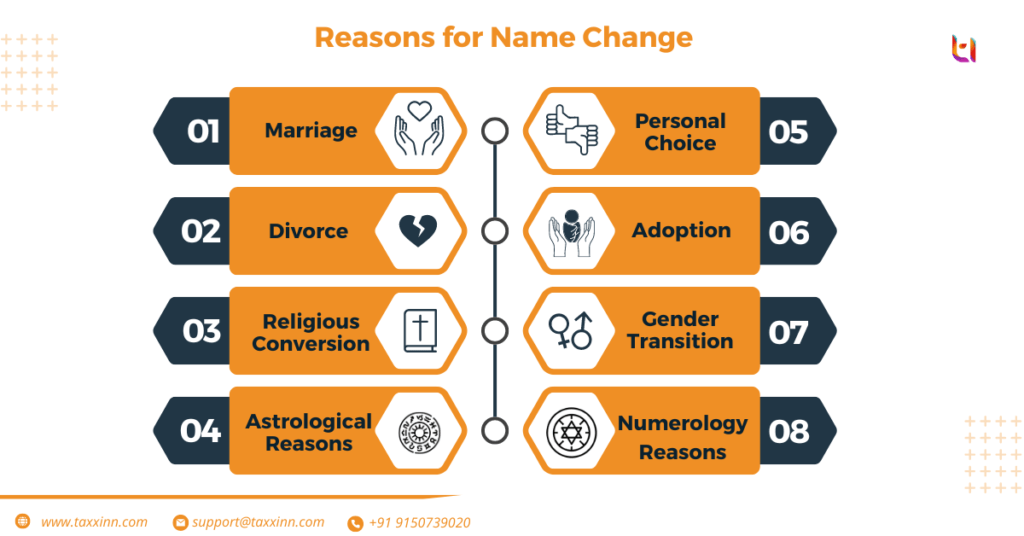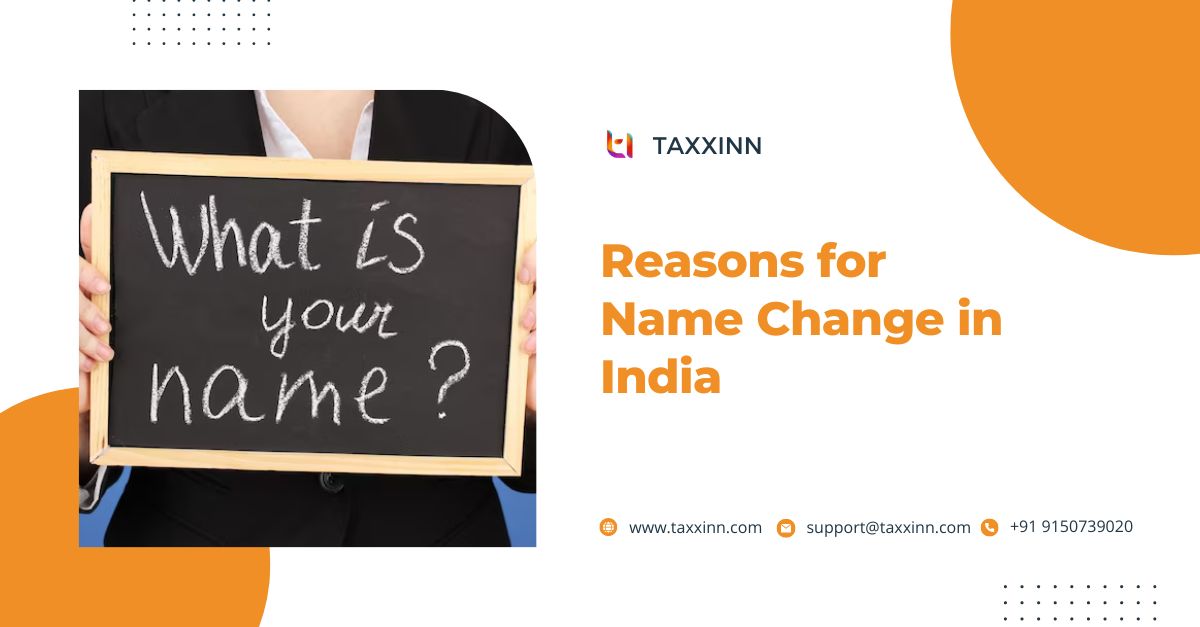In a country as diverse and complex as India, changing one’s name might seem daunting, but it is not uncommon. Whether driven by personal preference, social circumstances, or legal requirements, there are numerous acceptable reasons for name change in India. This article delves into the most common and compelling reasons for name change in India, the legal processes involved, and how individuals can navigate this transition smoothly.
Legal Name Change Process in India
The procedure for legally changing your name in India is systematic and straightforward,
- Creating an Affidavit: The first step involves drafting an affidavit that includes the reason for the name change, the old name, and the new name. This document is then notarized.
- Publishing in a Newspaper: After the affidavit is notarised, a notice must be published in at least two newspapers (one local and one national) announcing the name change.
- Gazette Notification: The name change must be published in the official Gazette of India. This step ensures that the name change is legally recognised across all government records.
Updating Documents: Once the Gazette notification is obtained, it is crucial to update all legal documents, including the Aadhaar card, passport, PAN card, and bank accounts, to reflect the new name.
Reasons For Name Change In India
There are various reasons for name Change in India, but it should be an accepted reason for name change by the legal framework. Some of the most common and acceptable name change reasons are listed along with their variation in document preparation according to the reason.

Marriage
In India, it is customary for women to adopt their husband’s surname after marriage, although this is not a legal requirement. Many women opt to change their names to represent their marital status.
Documents For Surname Change
The documents are similar to the regular name change process in India, except for a
- Marriage Certificate: Proof of marriage to support the name change.
Divorce
Conversely, following a divorce, a woman might choose to revert to her maiden name or select a completely new name as a step towards starting afresh.
- During Divorce: Request a name change in your divorce papers for it to be included in the final judgment.
- After Divorce: If not addressed in the divorce, apply for a name change through the official gazette to legally revert to your maiden name.
Documents Required to Revert to Maiden Name
- Divorce Decree: To revert to a maiden name or adopt a new name post-divorce.
The legal process for changing a name due to marriage or divorce is straightforward. It typically involves providing proof of marriage or divorce, publishing the change in a government-approved newspaper, and notifying relevant authorities like passport offices and banks. This reason is widely accepted without much scrutiny as it aligns with social norms.
Minor’s Name Change
In India, altering the name of a minor requires following the official procedures. A minor is defined as anyone under the age of 18, and name changes for minors can be prompted by various factors such as adoption, marriage, misspelt or personal choice.
Documents Required for Minor Name Change
The document preparation is similar to the other reasons except
- Birth Certificate: The original birth certificate showing the current name.
- Parental or Guardian Consent: Written consent from parents or guardians if the minor is under 18.
Personal Preference
- Personal preference is increasingly a common reason for name changes in India.
- Reasons can include dissatisfaction with their birth name, wanting a name that’s easier to pronounce or spell, or choosing a name that better reflects their personality.
- Changing a name for personal reasons requires more steps than name changes due to marriage but is legally allowed.
Applicants must provide a valid reason, submit an affidavit, publish the new name in a newspaper, and obtain a gazette notification. The law supports personal choice, allowing individuals to align their name with their identity, even for personal reasons.
Numerology and Astrology
- In India, cultural traditions are closely connected to beliefs in numerology and astrology.
- Many people change their names to align with favourable numbers or astrological charts.
- Although this may seem unconventional to outsiders, it is widely accepted and legally recognized in India.
- To change a name based on numerology or astrology, the process includes:
- Creating an affidavit.
- Publishing the name change in a newspaper.
- Getting the name change published in the official gazette.
- This process ensures the name change is legally binding and recognized across all official records.
Religion Conversion
- India has a rich tapestry of religious diversity.
- It is common for individuals to change their names after converting to a different religion or undergoing a profound spiritual transformation.
- Name changes for religious or spiritual reasons are legally accepted.
- The standard legal procedures must be followed, which include:
- Creating an affidavit.
- Publishing the name change in a newspaper.
- Getting the name change published in the official gazette.
Documents Required For Name Change Due to Religious Reasons
The affidavit, newspaper and gazette preparations are all the same but a
- Conversion Certificate (if applicable): Proof of conversion to a new religion.
Correcting Errors
Sometimes, the need to change a name arises from practical reasons such as correcting errors in official documents. This could involve rectifying spelling mistakes made during birth registration, updating records to reflect a more accurate version of the name, or correcting discrepancies across various documents like the Aadhaar card, PAN card, passport, and educational certificates.
The process generally involves submitting an affidavit that explains the nature of the error, providing supporting documents, and following the standard procedure of newspaper publication and gazette notification. These changes are crucial for avoiding legal complications and ensuring that all personal records are aligned.
Documents Required
- Original Document with Error: The document containing the incorrect name (e.g., birth certificate, Aadhaar card).
- Supporting Documents: Any other documents that prove the correct name.
Conclusion
Changing your name in India is a significant legal step motivated by various personal, social, or practical reasons. Whether due to marriage, personal preference, religious conversion, or correcting errors, the process is structured to accommodate the diverse reasons behind a name change. By following the legal procedures carefully, individuals can ensure that their new name is recognised across all official documents, reflecting their true identity. Understanding the acceptable reasons for name change in India is important. Taxxinn can guide you through the name change process.
Related Reads,
Steps for Legally Changing Name in India.
Legally Change the Name of a Minor in India.
Legally Change Your Surname After Marriage.
FAQs
What is the most common reason for a name change in India?
Marriage and divorce are the most common reasons for name changes in India, often involving women adopting or reverting to their maiden names.
Can I change my name for personal reasons in India?
Yes, you can change your name for personal reasons, such as dissatisfaction with your current name or wanting a name that better reflects your identity.
Is it legal to change my name based on numerology?
Yes, it is legal to change your name based on numerology or astrology. The process involves the same legal steps as any other name change.
How do I correct a spelling error in my name on official documents?
To correct a spelling error, you need to submit an affidavit, publish the correction in a newspaper, and obtain a gazette notification to update all relevant documents.
Do I need to provide a reason for changing my name?
Yes, when changing your name, you must provide a valid reason in your affidavit. This reason is necessary to process the legal paperwork.
How long does it take to legally change a name in India?
The entire process can take several weeks to a few months, depending on how quickly the affidavit, newspaper publication, and gazette notification are completed.

